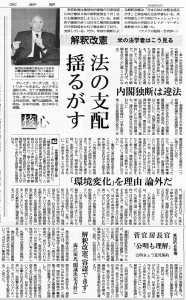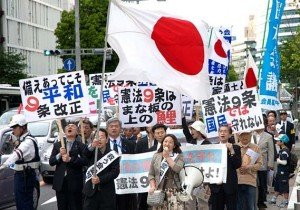(Published in the Japan Times, June 28, 2014, opposite and as counterpoint to an article by Prime Minister Shinzo Abe in defense of the policy)

Prime Minister Abe is expected to continue to press for Cabinet approval of a “re-interpretation” of the war-renouncing Article 9 of the Constitution of Japan. His goal is to relax the constitutional prohibition on Japan’s use of force for purposes of both engaging in collective self-defense actions and participating in U.N. collective security operations. There may be good reasons for Japan to consider relaxing the constraints of Article 9, but this so-called “re-interpretation” is entirely illegitimate and poses dangers to Japan’s democracy.
To be clear on what this so-called “re-interpretation” means, the Prime Minister is seeking to circumvent the constitutional amendment procedure mandated by the Constitution itself, and to dictate a radical change to the meaning of fundamental principles in the Constitution by way of Cabinet fiat, with no Diet debate or vote, and no public approval. The very process violates fundamental principles of constitutionalism and the rule of law, while the substance of the proposed “re-interpretation” does further violence to these principles.
To fully appreciate why this is so, we need to review briefly the relevant aspects of constitutionalism and the rule of law. Constitutions in democracies are typically the highest law of the land. They define and distribute authority, enshrine individual rights, and serve to limit the government’s power in important ways. Indeed, in this function of limiting the exercise of government power, particularly in moments of crisis, constitutions serve as “pre-commitment devices”. They constrain future generations to abide by the principles, rights, and power structures envisioned by the founders.
Read more



